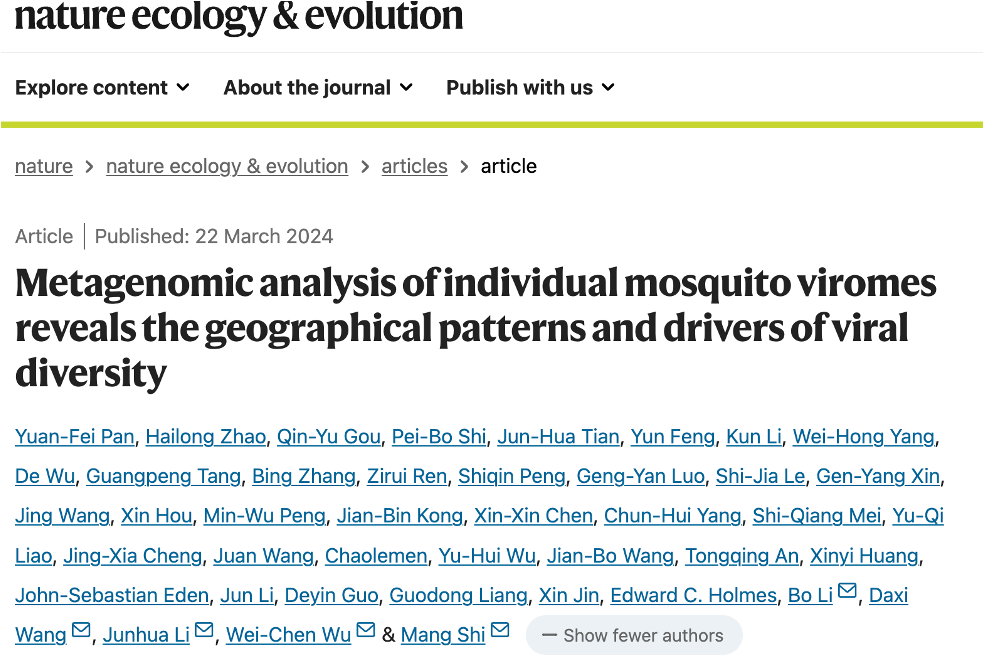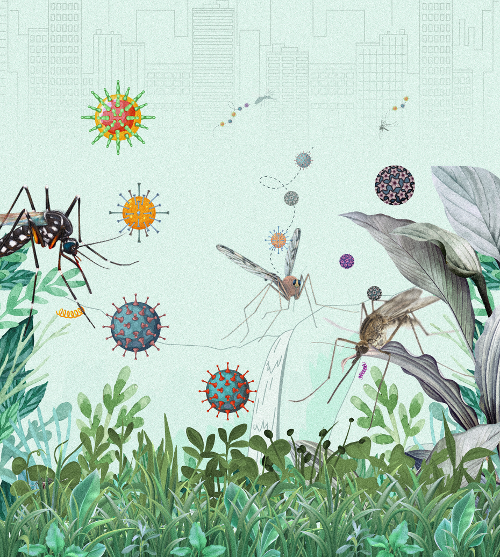On March 22, a collaborative study was published in Nature Ecology & Evolution by researchers from BGI-Research, Fudan University, and Sun Yat-sen University. This study represents the most extensive survey of the mosquito virome in China to date. The research team has linked the viral diversity within individual mosquitoes to the overall viral diversity across China, providing insights into the ecology of insect vector viromes, including virus prevalence, distribution, drivers of virome composition, and host specificity.
 The study “Metagenomic analysis of individual mosquito viromes reveals the geographical patterns and drivers of viral diversity” was published in Nature Ecology & Evolution.
The study “Metagenomic analysis of individual mosquito viromes reveals the geographical patterns and drivers of viral diversity” was published in Nature Ecology & Evolution.
The U.S. Centers for Disease Control and Prevention has labeled mosquitoes as the "world's deadliest animals." Despite a mere 2.5 milligrams in weight, mosquitoes earn this title due to their role in transmitting vector-borne diseases such as Malaria, Zika, and Yellow Fever, which result in over 700,000 deaths globally each year. The acceleration of global warming enhances both the reproduction and pathogen-carrying capacity of these insects, increasing the threat of emerging infectious diseases and posing significant challenges to public health worldwide. Nevertheless, world’s knowledge of insect viromes and their biogeographic distribution remains limited.
After a five-year effort, the team has constructed the most extensive mosquito virome data set to date. The research team collected 2,438 mosquito specimens from 23 provinces across various ecosystems, including densely populated and vegetation-rich areas. Using metatranscriptomic sequencing, researchers identified 393 mosquito-associated viral species, 63% of which are potentially novel, including three potential arbovirus species. This discovery significantly broadens existing knowledge of the diversity and novelty of mosquito-borne viruses.
The researchers investigated the environmental and host factors shaping viral diversity in mosquito populations. Both mosquito taxa and climatic condition are significant determinants of virome species richness and composition. Particularly, mosquito species carry varied viral diversity. Among the five primary mosquito species examined, Armigeres subalbatus hosted the greatest number of viral species, followed by Aedes albopictus. Regions with diverse mammalians, relatively low climates, and higher rainfall are also hotspots for a wide range of viruses.
 Mosquitoes are key transmitters of vector-borne diseases. (Credit: Jun Wang, BGI-Research)
Mosquitoes are key transmitters of vector-borne diseases. (Credit: Jun Wang, BGI-Research)
Further investigation was conducted into the host specificity of viruses associated with mosquitoes. The phylogenetic distance, or the evolutionary differences between mosquito species, limits the dispersal of many viruses. However, they also noted cases of generalist viruses that are capable of infecting various mosquito species.
A significant number of viruses were shared among mosquito species or genera, with some exhibiting notable genomic similarity across host taxa. The researchers propose that generalist viruses can infect multiple mosquito species or genera without requiring extensive adaptative evolution, whereas specialist viruses likely maintain a stricter association with their mosquito hosts.
The research team also explored the distribution of mosquito-associated viruses across wide geographical areas in the country and investigated how mosquito movement might influence the spread of viruses. A strong correlation was found between the genetic similarity of mosquito populations and the number of virus species shared between these populations, indicating that even mosquitoes separated by thousands of kilometers can carry the same viral species. The research team suggests that this indicates mosquito population dispersal may be an important factor in the long-distance spread of viruses and shaping the biogeography of mosquito-associated viruses.
The study was supported by the Global Pathogen Database Project (GPDP), initiated by BGI-Research in 2020. The GPDP aims to detect and discover zoonotic pathogens at the genomic level, enhance proactive disease control and prevention strategies, and provide comprehensive data for the identification of zoonotic pathogens.
Dr. Daxi WANG, Director of the GPDP and co-corresponding author from BGI-Research, commented, "Our objective is to collaborate with scientists globally to screen and identify pathogens from natural focus of infection. With around 25,000 samples already sequenced, our team is dedicated to expand the pathogen data platform by integrating various datasets on pathogens, vectors, and ecology, which will enhance our capacity in early warnings for emerging infectious diseases."
Ethical approval was obtained for this research.
This research article can be accessed here:
https://www.nature.com/articles/s41559-024-02365-0
Source:
CDC: Fighting the World’s Deadliest Animal
https://www.cdc.gov/globalhealth/stories/2019/world-deadliest-animal.html
10 Things You Should Know About Mosquitoes
https://www.dupagehealth.org/DocumentCenter/View/147/10-Things-You-Should-Know-About-Mosquitoes-PDF
6 Mosquito Diseases That Can Be Deadly
https://www.pfizer.com/news/articles/6_mosquito_diseases_that_can_be_deadly
WHO: Vector-borne diseases
https://www.who.int/news-room/fact-sheets/detail/vector-borne-diseases
The Effect of Global Warming on Infectious Diseases



